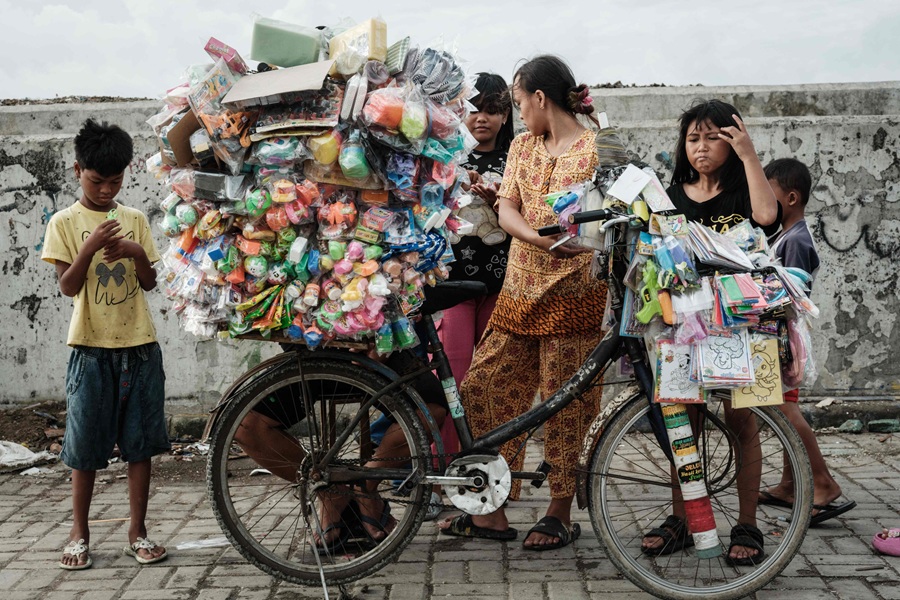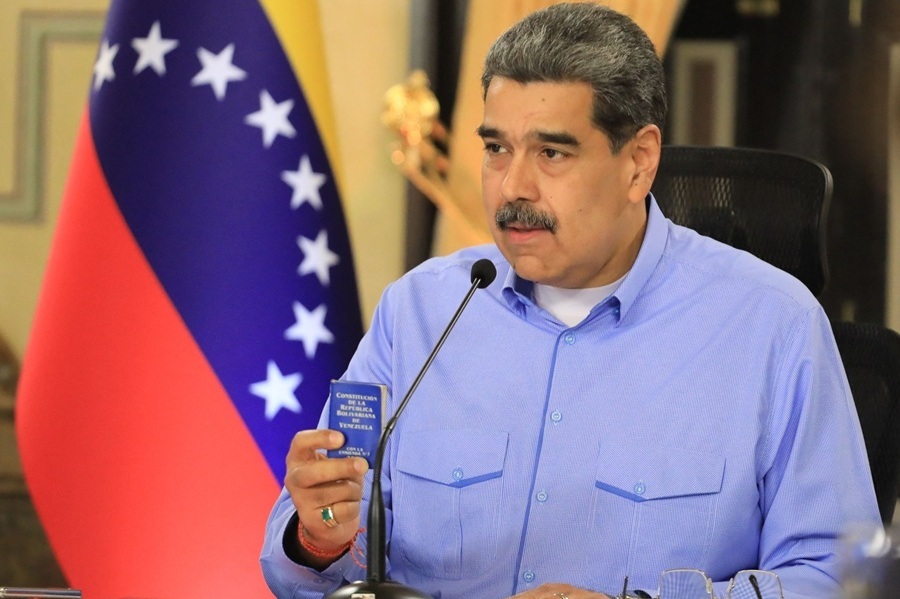Can Indonesia stay green while becoming the ‘Saudi Arabia of nickel’?
Indonesia’s push to become a nickel powerhouse amid its green energy transition threatens fragile ecosystems and local communities. The true test lies in balancing decarbonisation, biodiversity and geopolitical sovereignty amid growing Chinese influence, says researcher Ronny P Sasmita.

Indonesia’s energy transition has increasingly captured global attention. With abundant natural resources, a rapidly growing economy and high-profile commitments to cut carbon emissions, the country often presents itself as a rising champion in the global race to decarbonise.
Government officials proudly declare that Indonesia could become the “Saudi Arabia of nickel”, the indispensable metal for electric vehicle (EV) batteries, while simultaneously pledging to phase out coal in favour of solar, wind and geothermal energy. The vision is bold: a greener Indonesia that also sits at the heart of global clean technology supply chains.
The paradox is even more ironic in places like Raja Ampat, West Papua. Known worldwide for its marine biodiversity, the region has seen deforestation and sedimentation from nickel mining that threaten coral reefs...
Yet behind the optimism lies a profound paradox. Indonesia’s transition risks reproducing the same environmental and social harms long associated with fossil fuels, while also entangling the nation deeper into asymmetrical dependencies.
On one hand, the pursuit of EV battery dominance has unleashed a boom in nickel, cobalt and lithium mining that scars landscapes, pollutes rivers and disrupts communities. On the other hand, the massive pivot from coal to solar and geothermal reveals another irony: “clean” technologies rely heavily on extractive industries and come with social costs often dismissed in the name of progress. Most significantly, the transition is not just a domestic dilemma, it has a distinct geopolitical contour that increasingly tilts in favour of China.
Nickel dreams, Chinese chains?
The nickel sector exemplifies the contradictions of Indonesia’s green ambition. With global EV demand surging, Indonesia has positioned its vast nickel reserves as the backbone of its decarbonisation strategy and economic growth. The government has courted multinational corporations, signed billion-dollar deals and enforced an export ban on raw ore to force investment in domestic smelters. Superficially, this looks like an industrial policy designed to capture value at home. But beneath the surface, Chinese firms dominate the smelting and processing industry.
Through joint ventures, technology transfers skewed in China’s favour and financial leverage, Beijing’s companies have entrenched themselves in every stage of Indonesia’s nickel downstreaming chain. This reality creates a striking imbalance. In Sulawesi, open pit mines have gutted forests, destabilised watersheds and choked coastal ecosystems with runoff. Fishermen report dwindling catches, farmers lament about contaminated soils and local communities face displacement. Yet much of the nickel processed from these regions does not necessarily secure Indonesia’s prosperity; instead, it flows into China-centred supply chains where higher-value technologies are manufactured.

The paradox is even more ironic in places like Raja Ampat, West Papua. Known worldwide for its marine biodiversity, the region has seen deforestation and sedimentation from nickel mining that threaten coral reefs, ecosystems that naturally absorb carbon and protect coastlines. To degrade such globally vital ecosystems in order to produce “green” batteries reveals the cruel irony of the transition. What is justified as a contribution to fighting climate change may, in fact, worsen ecological vulnerability at home.
... Indonesia’s coal exit is not merely an environmental transformation but also a strategic realignment that strengthens Beijing’s influence over Indonesia’s energy future.
Solar, geothermal and the Red Dragon’s leverage
The same paradox extends to coal replacement. Indonesia rightly recognises the urgency of shifting away from coal, which still supplies more than half its electricity. Solar and geothermal are promoted as viable alternatives. However, both technologies expose new vulnerabilities. Solar panels, widely perceived as clean and abundant, rely on quartz sand often extracted through destructive mining practices. Large solar projects, such as the proposed industrial park on Pulau Rempang near Batam, threaten to displace entire communities while eroding coastal ecosystems. What is marketed as progress is experienced locally as dispossession.
Geothermal projects tell a similar story. Indonesia’s volcanic geography makes it one of the world’s richest reserves, but tapping these resources has repeatedly sparked conflict. In West Sumatra and Nusa Tenggara Timur, geothermal drilling has provoked opposition due to fears of water contamination, land rights violations and cultural disruptions. These are not isolated incidents but symptoms of a top-down technocratic approach that marginalises communities in pursuit of industrial-scale solutions.
What makes these stories more troubling is the geopolitical shadow cast over them. China dominates global solar manufacturing, accounting for over 80% of panel production, and is also heavily involved in financing Indonesia’s renewable projects. The Rempang solar park and numerous hydro and wind ventures are underpinned by Chinese capital, contractors and technology. This means that Indonesia’s coal exit is not merely an environmental transformation but also a strategic realignment that strengthens Beijing’s influence over Indonesia’s energy future.
The protests in Rempang, Sumatra and Nusa Tenggara Timur (NTT) are not obstacles to be bulldozed but warnings that the current trajectory is unsustainable.
Question of sovereignty
Indonesia’s transition faces challenges that go beyond environmental issues to include geopolitical concerns. The country’s ambition to leverage its resources for green industrialisation risks being subsumed into Beijing’s broader strategy of securing supply chains for the 21st-century energy economy.
For China, Indonesia’s nickel and renewables are not merely commercial interests but strategic assets in the competition for global leadership in green technology. For Indonesia, the danger is becoming a peripheral supplier locked into an extractive role, with limited technological sovereignty and political bargaining power.

The geopolitical implications are already visible. When European and American firms seek to enter Indonesia’s EV or renewable sectors, they often find themselves competing with entrenched Chinese companies backed by state-linked financing and established political ties. This imbalance risks narrowing Indonesia’s options, pushing it further into Beijing’s orbit even as it aspires to diversify. In effect, China becomes the unavoidable partner, not just one among many.
Recognising this dynamic demands a reframing of the transition. The dominant narrative of “green growth” that Indonesia can simultaneously decarbonise and turbocharge economic expansion obscures the deeper challenges of justice and sovereignty. Growth-centred approaches prioritise mega projects, foreign investment and industrial scale at the expense of communities and ecosystems. Worse, they open the door for geopolitical leverage by external powers, whose financing and technology dominate the sector.
Charting a just and independent transition
A just and sovereign transition requires three critical shifts. First, the extractive boom around nickel must be placed under strict regulation, with independent monitoring, transparent supply chains and meaningful enforcement of environmental protections. Without this, nickel risks becoming Indonesia’s new coal, an industry of vast profits for outsiders but deep scars at home.
Second, renewable energy development should embrace decentralised, community-driven models, rooftop solar, microgrids, and local cooperatives that minimise land conflicts and reduce reliance on foreign mega contractors. Third, Indonesia must diversify its international partnerships. Japan, South Korea, Europe and even domestic innovation must be brought into the fold to prevent any foreign nation’s overwhelming dominance.
The answer hinges on whether policymakers dare to move beyond the mirage of green growth and confront the hard truths of power, justice and sovereignty.
Crucially, social license to operate (SLO) must become a non-negotiable principle. Communities must not merely be consulted but actively shape the projects that transform their lands and livelihoods. Without genuine participation, resistance will grow, legitimacy will erode and projects will falter. The protests in Rempang, Sumatra and Nusa Tenggara Timur (NTT) are not obstacles to be bulldozed but warnings that the current trajectory is unsustainable.
Indonesia’s policymakers must also rethink how they measure success. Short-term indicators such as foreign direct investment and export growth tell only part of the story. True success lies in whether Indonesia can decarbonise while protecting biodiversity, empowering local communities, and maintaining strategic autonomy in an increasingly multipolar world. If not, the energy transition becomes less about sovereignty and more about subordination.

Indonesia stands at a geopolitical crossroads. The next decade will determine whether the nation secures a truly sovereign, sustainable transition or becomes a cautionary tale of how green ambitions can mask new dependencies. The temptation to chase quick wins through nickel exports, industrial mega projects and headline-grabbing deals is strong. But without recalibration, Indonesia risks trading coal dependence for nickel dependence, Western oil for Chinese solar, and local resilience for foreign leverage.
The paradox of Indonesia’s energy transition is therefore not just technological or environmental; it is geopolitical. Will Indonesia emerge as a leader charting an independent path toward sustainability, or as a resource appendage feeding China’s clean energy dominance? The answer hinges on whether policymakers dare to move beyond the mirage of green growth and confront the hard truths of power, justice and sovereignty.
If Indonesia succeeds, it could become a global example of how resource rich nations can leverage transitions for both ecological and geopolitical resilience. If it fails, it will illustrate how the promise of a green future can be captured by external powers, leaving behind little more than polluted rivers, displaced communities and lost sovereignty. The stakes could not be higher, not just for Indonesia, but for the future of global climate justice.





